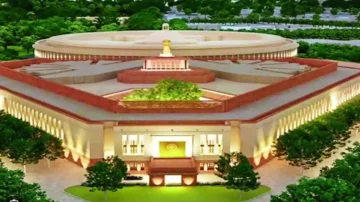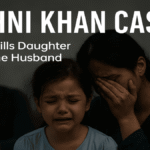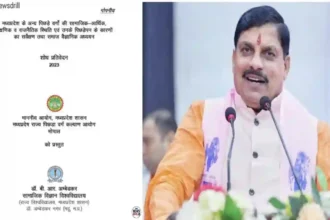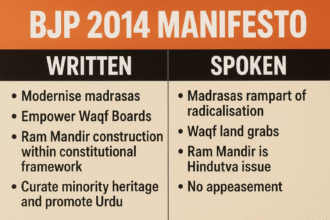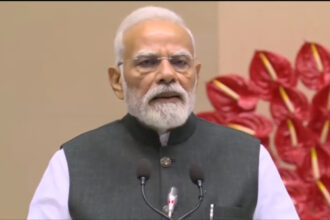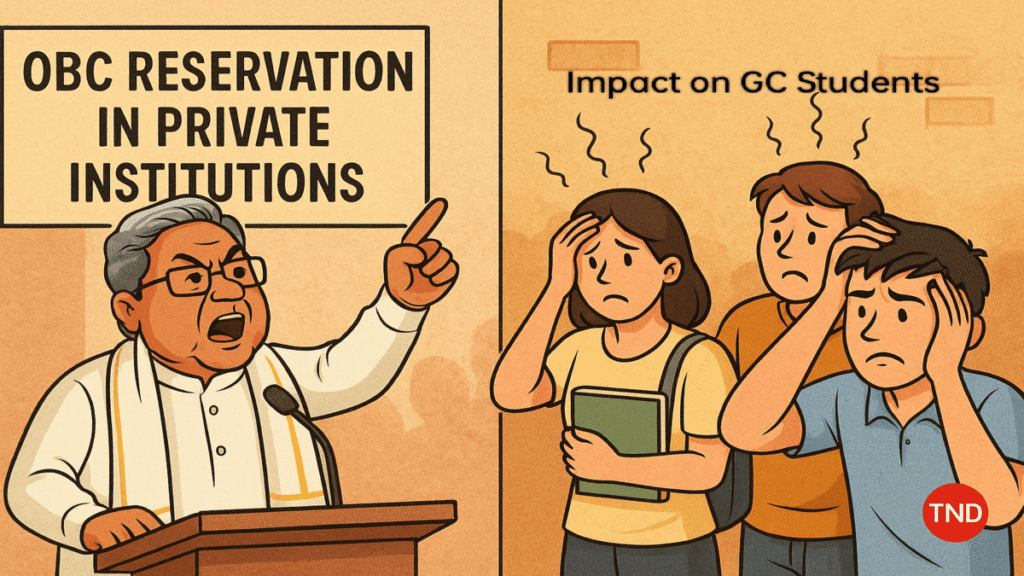
Bengaluru – In a significant political development, the Indian National Congress has pledged to launch a nationwide campaign for OBC reservation in private institutions, marking a major shift in the country’s education policy narrative. Karnataka Chief Minister Siddaramaiah, a prominent advocate of social justice, announced that the Congress is fully committed to ensuring that Other Backward Classes (OBCs) receive their rightful share in private educational colleges and universities.
Speaking at a press conference, Siddaramaiah said the party would “fight tooth and nail” to implement OBC reservation in private institutions across India, and accused the BJP led central government of maintaining silence on the issue for years.
The Demand for Reservation in Private Colleges
Currently, India mandates reservation for SCs, STs, and OBCs in government run institutions. However, private institutions are not uniformly required to follow this policy, except where states have implemented it under Article 15(5) of the Constitution. Siddaramaiah emphasized that this legal gap has deprived lakhs of OBC students of equitable access to high quality education.
Access to education should not depend on whether the college is public or private. The Congress stands for social equity in all sectors, and education is a priority,” Siddaramaiah said.
The Chief Minister added that the party would organize public campaigns, legal petitions, and parliamentary pressure to push for nationwide implementation of OBC reservation in private institutions.
Constitutional & Legal Basis
The 93rd Constitutional Amendment (Article 15(5)) allows the state to make special provisions for the advancement of OBCs in private educational institutions (excluding minority run ones). However, enforcement has been inconsistent and politically contentious.
Legal experts argue that unless the central government introduces a clear policy or law enforcing OBC reservation in private institutions, implementation will remain patchy and subject to political will in each state.
Congress’ Political Strategy
Congress’ push comes as part of its broader platform focused on social justice and representation. With rising demands for caste based census data and equity based education reforms, the issue of OBC reservation in private institutions is expected to become a flashpoint in upcoming state elections and the 2029 Lok Sabha polls.
Party insiders reveal that this issue will become one of the central pillars of the Congress campaign. The initiative is backed by national leaders like Rahul Gandhi and Mallikarjun Kharge, with plans to roll out state level rallies under the campaign theme “Shiksha ka Haq, Sabka Saath”.
Impact on General Category Students
While many hail the move as a step toward inclusive growth, critics especially from General Category communities have raised concerns over potential negative consequences.
Opponents argue that expanding quotas into private institutions may lead to:
- Reduced merit based seats for General Category students.
- Increased competition for a shrinking number of open seats.
- Higher fees, as institutions may adjust fee structures to accommodate reserved candidates.
- Psychological pressure on high scoring General Category students who already face intense competition for limited seats in premium colleges.
An engineering aspirant from Delhi, said:
“We respect the need for social equity, but at the same time, the government must protect the interests of meritorious students from the General Category. Cutting open seats even in private colleges will only increase the pressure.”
However, social justice advocates counter this by pointing to the over representation of forward castes in premier private institutions due to legacy admissions, financial privilege, and lack of inclusive frameworks.
One Socialist Sociologist explains:
The private education sector has become a fortress for upper caste, urban elites. Introducing OBC reservation in private institutions is not about exclusion, but about leveling the playing field.”
Must read article recommended to all General Category Citizens of India on Implications of Caste Census on GC.
Political Reactions
The BJP has reacted cautiously. While not opposing the idea outright, party leaders have accused the Congress of using OBC reservation in private institutions as a “vote bank politics strategy.”
On the other hand, regional parties like the DMK, RJD, and Samajwadi Party have expressed solidarity with the Congress’ stand. Student unions and Dalit-OBC rights groups have also welcomed the proposal, saying it is long overdue.
Ground Sentiments
In rural Karnataka, Bihar, and Uttar Pradesh, where access to quality education remains a challenge, many OBC families say they are hopeful. “Private colleges are beyond our reach, not just financially but socially,” said a farmer from Ballari, Karnataka.
“If our children can get admission on the basis of reservation, they will get a fair chance.”Yet, some urban middle class families feel alienated. “Every year we see cut-offs touching 99%. If reservation expands even in private colleges, where do General Category students go?” asked Priya Singh, a parent in Pune.
What Lies Ahead?
The debate around OBC reservation in private institutions is set to intensify. Whether the Congress’ campaign turns into policy change depends on multiple factors including public support, legal clarity, and political alliances.
But one thing is clear: the move has triggered a national conversation about who gets to access education in modern India and on what terms.
Contact us for feedback, tips, or your personal story about education access: contact@thenewsdrill.com
Submit tips: editor@thenewsdrill.com
For more updates on politics, social justice, and education policy, visit The News Drill.

